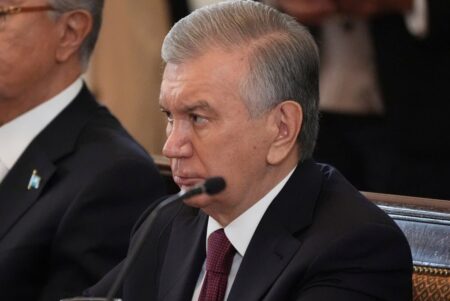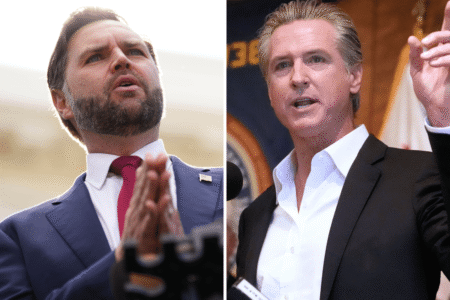Following months of intense speculation on Monday, presumptive Republican presidential candidate Donald Trump announced Ohio Senator JD Vance as his 2024 running mate.
Thus if Trump wins in November, which betmakers odds suggest he is favored to do, Vance could be just one serious illness or accident away from operating his own presidency as second-in-line. This point was rammed home on Saturday when Trump narrowly survived after a gunman opened fire on a rally he hosted in Pennsylvania, before himself being shot dead. The incident left Trump with a bleeding ear and killed one of his supporters, later identified as volunteer firefighter Corey Comperatore.
Vance was initially a fierce critic of Trump, reportedly questioning whether he could be “America’s Hitler” in a 2016 text message to a friend, but has since become a loyal supporter of the Republican firebrand. Newsweek spoke to a number of political scientists about what a Vance presidency could look like, with one claiming Trump may have picked him to be “the future of the MAGA project.”
Addressing Newsweek, Thomas Whalen, an expert in American politics who teaches at Boston University, predicted Vance would take a harder line on abortion and immigration than Trump if he assumes the presidency, and would also pull the United States out of the NATO alliance.
The academic said: “Vance would govern as a Trump on steroids. He would be even harsher (if that’s possible) on women’s reproduction rights and immigration. He would also pay lip service to our country’s laboring masses while stripping them of Medicare and Medicaid benefits, not to mention slashing their social security.
“On foreign policy he would do the ghost of Charles Lindbergh proud by pulling the U.S. out of NATO entirely and taking a Fortress America approach. He could call his presidency Authoritarian Elegy.”
In 2021, Vance sparked controversy when he suggested abortion exemptions for rape and incest were morally wrong. Asked whether he’d support abortion access in these circumstances during an interview with Spectrum News 1, Vance replied: “I think two wrongs don’t make a right. At the end of day, we are talking about an unborn baby.” However, there are no indications the Trump campaign plans to adopt this stance as part of its 2024 policy platform.
Writing for The New York Times in 2017, Vance criticized Republican efforts to repeal the Affordable Care Act, also known as Obamacare, claiming this would hit low income voters. After Trump repeated his desire to abolish the program in 2023, Vance said some parts were “ripe for reform,” but added the law was “broadly popular.”
Andrew Wroe, a senior lecturer in American politics at the University of Kent in the U.K., told Newsweek that out of the main candidates Trump was reportedly considering as his running mate, Vance had the most in common politically.
He said: “My sense is that of the three prospective VP candidates ([Marco] Rubio, [Doug] Burgum and Vance), Vance was the most closely aligned ideologically to Trump. While Trump is not a deep thinker, Vance has articulated an internally coherent ideological position that gives intellectual weight to Trump’s political instincts. I don’t think there are any gapping chasms between them on policy.
“Thus, in picking Vance, Trump might have been thinking about the future of the MAGA project and decided that Vance was the best to pursue it once he left the stage. Of course, that may not have been Trump’s primary concern. It’s likely that Trump may have given equal or more weight to Vance’s perceived loyalty, ability to perform well (and defend him) on television, and the fact that they seem to get on well together.”
Wroe argued a Vance presidency would likely be more organized than a Trump one, but said both men would seek to centralize power in the White House.
He said: “Trump’s first term was simply chaotic. The White House was an organizational mess. His closest aides spent most of their time managing up (i.e. firefighting the Trump-caused chaos) rather than managing down in order to effect their policy agenda. A Vance presidency could not be this bad; no presidency could be this bad.
“I also think a Vance presidency would be less demagogic, less bombastic, less driven by a desire for retribution toward his political enemies. But I suspect that a Vance presidency would, like Trump’s, pursue the centralization of power in the office of the presidency (flowing from ‘unitary executive theory’ and the Project 2025 agenda), which has important implications for the delicate system of checks and balances in the American constitution and ultimately for the operation of democracy.”
On foreign policy, Vance has attracted attention as a prominent critic of American military aid to Ukraine. Appearing on Steve Bannon’s War Room podcast in 2022, he said: “I gotta be honest with you, I don’t really care what happens to Ukraine one way or another.”
Andrew Payne, a foreign policy expert who teaches at City, University of London and is a research associate at Oxford University, told Newsweek Vance backs a foreign policy that would be more nationalistic and China focused than other senior Republicans.
He said: “Vance is an ‘Asia-first’ Republican. He supports tariffs on Chinese goods. He opposes funding for Ukraine. He thinks European allies should shoulder a greater share of the responsibility for their security needs. These positions sharply differ from the swashbuckling internationalism that characterized the Republican Party of the Reagan era. But they are mainstream now.
“As vice president, Vance’s principal role would be as cheerleader and global spokesperson for Trump’s ‘America First’ agenda. But whereas Mike Pence made great effort to reassure nervous allies about Trump’s intentions, Vance is more likely to amplify the nationalist impulses of his boss, rather than soften them. Having served as a kind of attack dog for the former president on the campaign trail, the one-time ‘Never-Trumper’ will likely toe the party line on the world stage.”
Newsweek contacted the congressional office of Senator JD Vance for comment by email outside of normal office hours.
Read the full article here














